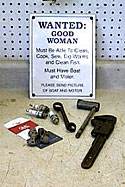 |
Wondering Right Here! |
|
Meet the MasterTech! |
If your Mfgr. says: That motor's 7 years old!!
Part is no longer available. We lose $$ on service! EPA made me do it! Part's at central warehouse, you'll get it next month. We don't make parts for those. We only do warranty work. Our techs only fix late models. No clue what's wrong! So we'll work time & material.
Baloney!! Contact
|
|
OPINIONS STATED HERE ARE THE RESULT
OF MY EXPERIENCES OVER THE LAST 40-PLUS YEARS AS A MARINE DEALER AND
TECHNICIAN.
Q: I use 87 octane in my car, why can't I use
it in my outboard?
This stuff's not fit to use in your lawn mower, let alone a $12,000 high performance outboard motor. The low octane and lack of detergent additives just leave you open to motor failures from detonation, gum and carbon formation, coked up rings and piston scuffing. Your automotive engine is a 4 stroke with totally different lubrication and fuel usage requirements. Q: Can I use oxygenated gasoline in my boat? A major oil company survey of the manufacturers of engines for non-automotive uses -- boats, garden tools, chain saws and snowmobiles -- indicates that oxygenated gasoline will perform satisfactorily in most later-model engines. However, some manufacturers expressed concerns about its use in older engines. The owner's manual is the most authoritative source of information about the fuel requirements of your equipment. If your equipment is older and the manual does not mention oxygenated gasoline, consult an authorized dealer. Oxygenated gasoline will perform satisfactorily in most engines under normal conditions of storage and use. However, you should be aware of the potential problems -- two involving the gasoline itself and several involving gasoline/equipment interactions. Follow the suggested precautions if they apply to your situation. Main Concerns are:
Practice Good Fuel Management
"Vapor lock" is loss of power or engine shutdown due to gasoline vaporization in the fuel system. Vaporization prevents the fuel pump from delivering sufficient gasoline to the engine. Factors favoring vapor lock are high ambient temperatures which accompany high power output. Sometimes vaporization occurs after the engine has been intentionally stopped because of the cessation of mechanical cooling and fuel flow. In this case, the hot engine will be difficult to start. Vapor lock and hot restarting have been reoccurring problems for engine manufacturers. Some manufacturers are concerned that oxygenated gasoline will aggravate these problems because adding either ethanol or MTBE to gasoline increases volatility. The volatility of gasoline sold in each area of the country is tailored for the expected ambient temperature range. Buying smaller amounts of gasoline more frequently make it more likely you will have a gasoline of the correct volatility. Your owner's manual may suggest additional ways to avoid vapor lock. Remember that some situations lead to vapor lock more often than others. One is running an engine at full power for an extended time on an unseasonably warm day. If vapor lock does occur, it will probably be necessary to allow the engine to cool before it can be restarted. Q: What Octane gasoline should I use for my outboard?I have an older outboard with higher compression. Should I burn PREMIUM gas? NO! Here's why: the octane ratings are composed of 2 components, research octane and motor octane (RXM/2) divided by 2. The RESEARCH octane is the quality of the base stock, the MOTOR octane is derived from additives. The oil company will never tell you the ratios. Problem is the highest octanes are achieved by MOTOR octane additives, which will just gum up the pistons in a 2 cycle engine. Base stock is generally the same. The MID-GRADE gas has the detergent additives needed to clean your motor and sufficient octane for MOST motors. If you have a MERCURY, FORCE or OMC motor from the early 70's thru mid-80's refer to technical bulletins from the manufacturers for timing changes and replacement head gaskets to lower compression to use today's gasoline. |
|||||||||||||||||
|
|||||||||||||||||
|
Please review our Warranty, Returns & Refunds policies before you place an order. DISCLAIMER The information provided on these pages is correct to the best of my knowledge, however the MasterTech makes no warranty, express or implied, regarding the use of, results of, or liability created from, application of this data. This information is disseminated in good faith, however MasterTech assumes NO LIABILITY whatsoever in regard to this service. The information, software, products, and services published on this web site may include inaccuracies or typographical errors. Changes are periodically added to the information herein. Mastertech may make improvements to this site at any time. Parts ordered from this website may or may not be in dealer stock at the time of order. Thank you for reading. Revised: November 19 2019
| |||||||||||||||||




